Genetics
Genetics is the study of genes, heredity, and variation in living organisms. It is a branch of biology that explores how traits are passed from parents to offspring through the transmission of DNA. The field of genetics encompasses a wide range of topics, including genetic variation, inheritance patterns, genetic disorders, and the role of genes in evolution.
Key Concepts in Genetics
- Genes: Genes are the basic units of heredity. They are segments of DNA that contain the instructions for building and maintaining an organism's cells and tissues.
- Chromosomes: Chromosomes are structures within the cell that contain the genetic material. They are made up of DNA and proteins, and they carry the genes that determine an organism's traits.
- Heredity: Heredity is the passing of traits from parents to offspring. This process occurs through the transmission of genetic information from one generation to the next.
- Genetic Variation: Genetic variation refers to the differences in DNA sequences among individuals within a population. It is the basis for the diversity of traits observed in living organisms.
- Mendelian Genetics: Mendelian genetics is the study of inheritance patterns as described by Gregor Mendel. It includes concepts such as dominant and recessive traits, Punnett squares, and the laws of segregation and independent assortment.
- Genetic Disorders: Genetic disorders are conditions caused by abnormalities in an individual's genetic material. They can be inherited from parents or arise from spontaneous mutations.
- Genetic Engineering: Genetic engineering involves the manipulation of an organism's DNA to introduce new traits or modify existing ones. It has applications in agriculture, medicine, and biotechnology.
Study Guide for Genetics
To understand genetics, it is important to grasp the following key concepts:
- Define genes and explain their role in heredity.
- Describe the structure and function of chromosomes.
- Discuss the principles of heredity and genetic variation.
- Explain Mendel's laws of inheritance and their significance in genetics.
- Identify examples of genetic disorders and their causes.
- Explore the applications of genetic engineering in various fields.
By mastering these concepts, you will develop a solid understanding of genetics and its significance in the study of living organisms.
[Genetic] Related Worksheets and Study Guides:
.◂Science Worksheets and Study Guides Sixth Grade. Plant Processes
Study Guide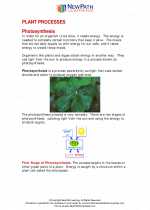 Plant Processes
Plant Processes  Activity Lesson
Activity Lesson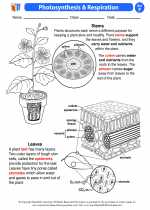 Photosynthesis & Respiration
Photosynthesis & Respiration  Worksheet/Answer key
Worksheet/Answer key Plant Processes
Plant Processes  Worksheet/Answer key
Worksheet/Answer key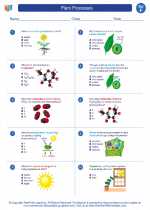 Plant Processes
Plant Processes  Worksheet/Answer key
Worksheet/Answer key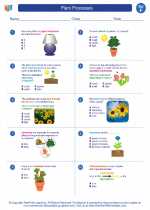 Plant Processes
Plant Processes  Worksheet/Answer key
Worksheet/Answer key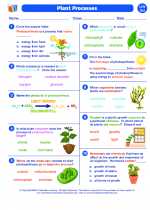 Plant Processes
Plant Processes  Vocabulary/Answer key
Vocabulary/Answer key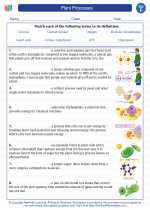 Plant Processes
Plant Processes  Vocabulary/Answer key
Vocabulary/Answer key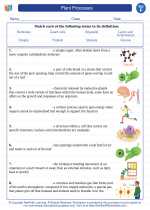 Plant Processes
Plant Processes 

 Activity Lesson
Activity Lesson
 Worksheet/Answer key
Worksheet/Answer key
 Worksheet/Answer key
Worksheet/Answer key
 Worksheet/Answer key
Worksheet/Answer key
 Worksheet/Answer key
Worksheet/Answer key
 Vocabulary/Answer key
Vocabulary/Answer key
 Vocabulary/Answer key
Vocabulary/Answer key

The resources above cover the following skills:
LIFE SCIENCE
From Molecules to Organisms: Structures and Processes
Students who demonstrate understanding can:
Construct a scientific explanation based on evidence for the role of photosynthesis in the cycling of matter and flow of energy into and out of organisms.